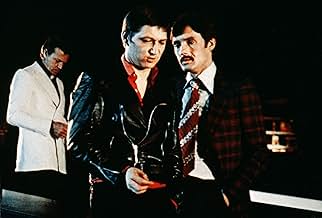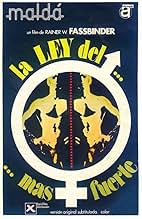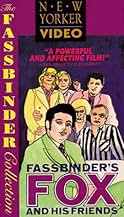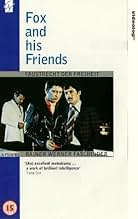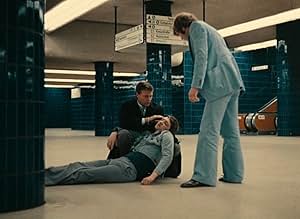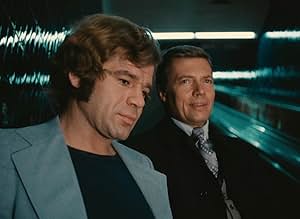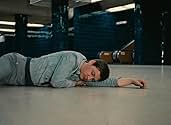IMDb RATING
7.6/10
7.3K
YOUR RATING
A suggestible working-class innocent wins the lottery but lets himself be taken advantage of by his bourgeois new boyfriend and his circle of materialistic friends.A suggestible working-class innocent wins the lottery but lets himself be taken advantage of by his bourgeois new boyfriend and his circle of materialistic friends.A suggestible working-class innocent wins the lottery but lets himself be taken advantage of by his bourgeois new boyfriend and his circle of materialistic friends.
- Director
- Writers
- Stars
- Awards
- 1 win total
Karlheinz Böhm
- Max
- (as Karl-Heinz Böhm)
Harry Baer
- Philip
- (as Harry Bär)
Karl-Heinz Staudenmeyer
- Krapp
- (as Karl Heinz Staudenmeier)
Marquard Bohm
- American Soldier
- (as Marquart Bohm)
- Director
- Writers
- All cast & crew
- Production, box office & more at IMDbPro
Featured reviews
"Faustrecht der Freiheit" occupies a valued place in my video collection. I find myself returning to it again and again, thoroughly enjoying Fassbinder's talent, which run throughout the film. Perceptive, witty and challenging, this drama provides astute observations on societal motivations, political aspirations and, above all, human nature.
Man has mastered the art of wielding Power. Show him an inch and he will become your slave, give him an inch and he will become your master. And you watch while he takes the whole nine yards around your hearth & eventually your gravestone as well. Fox and his Friends resonates many themes from Ali: Fear eats the Soul, Fassbinder's soothing, Melancholic masterwork. In 'Ali' the protagonists Emi and Eli literally dance into each other's arms whereas in Fox Eugen and Fox clash and spar with unabashed animal magnetism. Franz Bieberkopf a.k.a Fox is a variety show entertainer named The Speaking Head. He is an "abnormal on an Itinerant stage," as one line introduces us to him. His lover is arrested, the show is packed off and so is Fox, who is too polite and cowardly to remonstrate the Manager's unfairness. A latter line alludes to Fox being picked up from a "pubic urinal." 'Fox and Friends' is unapologetic and brutal in its portrayal of Sexual Politics and Power Equations. That it bases its premise on homosexuality is a moot point. What the mood of the film conveys or what the acting styles convey is a hopeless, recursive, silent Machinery laughing away at genuine peoples efforts to wriggle out. Fox's luck changes after an escapade he engineers. His singular belief in winning a lottery drives him to the deed though he is initially mugged after he legally borrows an amount. Fox is picked up by an aristocratic gent named Max. This brief scene is memorable for the three lightning edit cuts and freeze frames that show a rendezvous being established through codes and signals.
Fox is introduced to Max's friends and is promptly attracted to and simultaneously repulsed by Eugen Thiess, a vain and ambitious bourgeois upstart. These are probably Fox's most liberating moments; when his street gab and penny tricks help him parry Eugen's sarcasm. But these defenses are soon exhausted when Fox's limitations loom large. He is ugly, poor, unschooled and "unskilled," as Eugen later points out. He is a homosexual from the streets. He will find no sympathy in a society that compels one to find power and to use it. His "proletariat potency," he knows is transient and viewed as a natural disposition to "boozing, scoffing and screwing." Eugen is an opportunistic entrepreneur who is quick to move in on Fox's vulnerability to acquire all the trappings that will win him society's approval.
The editing here has amaelstrom like effect; events unspooling at a breathless pace, sharply contrasting the layers being peeled off Max's slight persona. Eugentactfully manipulates Fox as he climbs the social ladder, rescuing a family business and acquiring tasteful 'possessions.' Fox is useful for as long as he has the prize money. Eugen's family is respectful to Fox when in need but quickly change colors when tides change. Fassbinder casts himself as Franz and his interpretation of the role is pitch perfect. Peter Chatel is suitably stoic as Eugen, the scheming lover. I could sense an icy chillness each time Karlheinz Bohm appeared on screen. It was no small surprise when my rusty memory discovered that my only introduction to his work was in Michael Powell's icy, voyeuristic 'Peeping Tom.' Bohm as Max the antiques dealer infuses a chilling, menacing air to his character. Intermittent and lurking, he lands up at important intervals in Fox's journey. Michael Ballhaus' (also a Kubrick and Scorsese regular) camera-work has a languid dexterity that together with Fassbinder's frames create moments of lingering pathos. Filters and geometrical motifs accentuate the fractured personalities and hollowness of meaningless lives. The contributions of other characters lend a dramatic weight to the final act of betrayal – the stampede of the Herd. Two performances merit special mention; Hans Zander as the snide barman Springer and Peter Kern as the lecherous florist 'Fatty' Schmidt. The subject matter of the film created a huge controversy upon release. Fassbinder was accused of being homophobic despite being openly homosexual. There are some nude male frontal scenes that have never been depicted so openly since. Some frames depict young boys as Adonis like props, objectified for sexual predators or as mute adornments in depraved Saturnalia. In one telling scene Fox blocks out the reflection of a nude boy to prevent Eugen from looking on. In a polarized world Fox is easy meat, even for the weakest of predators. His body is the only commodity he can sell and as Eugen explains " Fox is not the kind of guy money can make rich."
With 'Ali,' Fassbinder floored me. With 'Fox' he has me hooked for life. My personal rating- 7.8/10
Fox is introduced to Max's friends and is promptly attracted to and simultaneously repulsed by Eugen Thiess, a vain and ambitious bourgeois upstart. These are probably Fox's most liberating moments; when his street gab and penny tricks help him parry Eugen's sarcasm. But these defenses are soon exhausted when Fox's limitations loom large. He is ugly, poor, unschooled and "unskilled," as Eugen later points out. He is a homosexual from the streets. He will find no sympathy in a society that compels one to find power and to use it. His "proletariat potency," he knows is transient and viewed as a natural disposition to "boozing, scoffing and screwing." Eugen is an opportunistic entrepreneur who is quick to move in on Fox's vulnerability to acquire all the trappings that will win him society's approval.
The editing here has amaelstrom like effect; events unspooling at a breathless pace, sharply contrasting the layers being peeled off Max's slight persona. Eugentactfully manipulates Fox as he climbs the social ladder, rescuing a family business and acquiring tasteful 'possessions.' Fox is useful for as long as he has the prize money. Eugen's family is respectful to Fox when in need but quickly change colors when tides change. Fassbinder casts himself as Franz and his interpretation of the role is pitch perfect. Peter Chatel is suitably stoic as Eugen, the scheming lover. I could sense an icy chillness each time Karlheinz Bohm appeared on screen. It was no small surprise when my rusty memory discovered that my only introduction to his work was in Michael Powell's icy, voyeuristic 'Peeping Tom.' Bohm as Max the antiques dealer infuses a chilling, menacing air to his character. Intermittent and lurking, he lands up at important intervals in Fox's journey. Michael Ballhaus' (also a Kubrick and Scorsese regular) camera-work has a languid dexterity that together with Fassbinder's frames create moments of lingering pathos. Filters and geometrical motifs accentuate the fractured personalities and hollowness of meaningless lives. The contributions of other characters lend a dramatic weight to the final act of betrayal – the stampede of the Herd. Two performances merit special mention; Hans Zander as the snide barman Springer and Peter Kern as the lecherous florist 'Fatty' Schmidt. The subject matter of the film created a huge controversy upon release. Fassbinder was accused of being homophobic despite being openly homosexual. There are some nude male frontal scenes that have never been depicted so openly since. Some frames depict young boys as Adonis like props, objectified for sexual predators or as mute adornments in depraved Saturnalia. In one telling scene Fox blocks out the reflection of a nude boy to prevent Eugen from looking on. In a polarized world Fox is easy meat, even for the weakest of predators. His body is the only commodity he can sell and as Eugen explains " Fox is not the kind of guy money can make rich."
With 'Ali,' Fassbinder floored me. With 'Fox' he has me hooked for life. My personal rating- 7.8/10
Fox and his Friends caused some controversy when it was first made - it was thought that this story of a gay sideshow worker who wins the lottery, only to be exploited to the hilt by his upper-class lover, was potentially homophobic. Fassbinder himself commented that the story could have been about a heterosexual relationship, but it wouldn't have been as clear.
Fassbinder himself plays Fox - the burly ugly duckling of German cinema miraculously slimmed down, looking almost handsome. Fox's street skills and good humour are undercut by his naivety, as his repellently snobbish boyfriend systematically scams him out of the thousands of marks he's won on the lottery. The story proceeds with ruthless inevitability, as Fox becomes more and more demoralised. Yet the film contains some of Fassbinder's sharpest comedy, particularly in a brilliantly embarrassing dinner party scene. RWF is excellent in the title role; amazing to think that the guy who wrote and directed the film (among so many others) could play a good-natured dimwit with such conviction.
Fassbinder himself plays Fox - the burly ugly duckling of German cinema miraculously slimmed down, looking almost handsome. Fox's street skills and good humour are undercut by his naivety, as his repellently snobbish boyfriend systematically scams him out of the thousands of marks he's won on the lottery. The story proceeds with ruthless inevitability, as Fox becomes more and more demoralised. Yet the film contains some of Fassbinder's sharpest comedy, particularly in a brilliantly embarrassing dinner party scene. RWF is excellent in the title role; amazing to think that the guy who wrote and directed the film (among so many others) could play a good-natured dimwit with such conviction.
The ironically titled Fox and His Friends, Fassbinder's rather excellent study of a none-too-bright circus worker who wins a small fortune in the lottery, is a touching film that features a great performance from Fassbinder himself in the title role. A reflection on the class system and homosexual relationships of 1970's Germany, Fox and His Friends is unsentimental and guileless most of the time. Fox (Fassbinder) is one of the main attractions of a circus like festival, with his lover being arrested for tax fraud. Fox somehow knows he'll win the lottery, so when he picks up a wealthy man at the local 'pick-up toilets', Fox makes sure he reaches the store in time to lodge his ticket. Cut to Fox celebrating his 500 000 marks win, he's drinking in his usual tavern with the effete bar staff and clientele. Fox then somehow becomes involved with a somewhat arrogant and pretentious man, already in a relationship, who takes the naïve Fox for a ride, spending his money in selfish and extravagant ways. Fassbinder's melodrama is droll and poignant, with a tragically ironic ending. Oh, and you have to give extra marks to a director who inserts lengthy nude scenes of themselves in their films.
The main point of Fox and his Friends seems to be that money corrupts the chances of meaningful human interaction; and the movie has a lot more going for it, there's a deep aesthetic richness, quality of textual reference, and it has the pulse of relationships.
Franz aka Fox is a circus entertainer who wins the lottery and is then fleeced by those whose love he aspires to.
I found myself admiring Fassbinder and Ballhaus' homages to Sternberg, taking the slatted light of Mogador (Morocco - 1930) and pouring colour in, so that the Moroccan street looks like late Bridget Riley. Following on from Welt am draht two years earlier another of Dietrich's iconic moments under Sternberg's gaze is referenced (Dishonored in Welt am draht, Shanghai Express here), pallid mockeries full of weltschmerz (weltschmerz heaped on weltschmerz), a sense that life might be better.
It's quite easy to get carried away with the design, to see the movie as a parade of yellow dresses and peach-coloured flowers. There's a relentless gay aesthetic, for example Eugen, the dandy entrepreneur who grifts fox, has a poster for The Prince of Homburg in his flat, the ambisexual play by high-strung Heinrich von Kleist, whose search for the ideal, seems to govern Eugen's private life. Eugen is an unpleasant man, there's a brilliant shot of him looking through a spyhole, keeping his distance from his waiting lover, coolly observing.
Franz has panic attacks in the movie, a good touch I thought, that's what unrequited love does to you. Aesthetically the best of Fassbinder's movies that I've seen. Gods of the Plague touches it out in terms of successful content.
Franz aka Fox is a circus entertainer who wins the lottery and is then fleeced by those whose love he aspires to.
I found myself admiring Fassbinder and Ballhaus' homages to Sternberg, taking the slatted light of Mogador (Morocco - 1930) and pouring colour in, so that the Moroccan street looks like late Bridget Riley. Following on from Welt am draht two years earlier another of Dietrich's iconic moments under Sternberg's gaze is referenced (Dishonored in Welt am draht, Shanghai Express here), pallid mockeries full of weltschmerz (weltschmerz heaped on weltschmerz), a sense that life might be better.
It's quite easy to get carried away with the design, to see the movie as a parade of yellow dresses and peach-coloured flowers. There's a relentless gay aesthetic, for example Eugen, the dandy entrepreneur who grifts fox, has a poster for The Prince of Homburg in his flat, the ambisexual play by high-strung Heinrich von Kleist, whose search for the ideal, seems to govern Eugen's private life. Eugen is an unpleasant man, there's a brilliant shot of him looking through a spyhole, keeping his distance from his waiting lover, coolly observing.
Franz has panic attacks in the movie, a good touch I thought, that's what unrequited love does to you. Aesthetically the best of Fassbinder's movies that I've seen. Gods of the Plague touches it out in terms of successful content.
Did you know
- TriviaThe normally overweight Rainer Werner Fassbinder dieted strenuously to lose weight in order to play the role of Fox, which included a full-frontal nude scene.
- GoofsOne character mentions that one could receive money from the city for collecting June bugs (May beetles, genus Phyllophaga) as children. In reality, children were paid for collecting Colorado potato beetles (Leptinotarsa decemlineata), an invasive species.
- How long is Fox and His Friends?Powered by Alexa
Details
- Release date
- Country of origin
- Official sites
- Languages
- Also known as
- La ley del más fuerte
- Filming locations
- Petersplatz, Munich, Bavaria, Germany(clock tower)
- Production companies
- See more company credits at IMDbPro
Box office
- Budget
- DEM 450,000 (estimated)
- Gross US & Canada
- $8,144
- Opening weekend US & Canada
- $11,623
- Feb 16, 2003
- Gross worldwide
- $8,158
- Runtime
- 2h 4m(124 min)
- Sound mix
- Aspect ratio
- 1.37 : 1
Contribute to this page
Suggest an edit or add missing content

